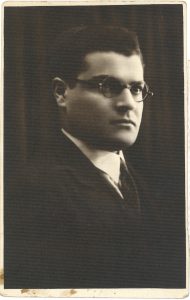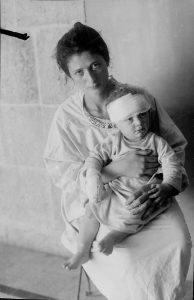From Jewish Action

Rabbi Moshe Gold
[Rabbi Chaim Gold Shlita was my 8th grade Rebbi]
Descended from a long line of talmidei chachamim, Rabbi Moshe Gold, a survivor of the Hebron Massacre, was one of the early students of Yeshiva Torah Vodaath. His father, Rabbi Zev, served as the rav of a shul in Williamsburg, New York, where Rabbi Binyamin Wilhelm (Rabbi Yisroel Belsky’s grandfather), the founder of Yeshiva Torah Vodaath, was a congregant. In those days, most of the Jewish immigrants in America were reticent about sending their children to yeshivah; it was considered “un-American.” Rabbi Zev had other ideas. He took his young son Moshe, then six years old, to visit all the Jewish homes in the neighborhood and announced, “My son is going to yeshivah. Your son is coming with him.” Along with Moshe, these students formed the original nucleus of Yeshiva Torah Vodaath.
In 1921, when Moshe turned nine, the family moved to Eretz Yisrael. When he was a teenager, a conversation with a group of bachurimwho were attending the Hebron Yeshiva made a profound impression on him. He came home and told his father, “I want to go learn in Hebron.”
What follows are the words of Rabbi Chaim Gold, seventy-seven, a former rebbe at Manhattan Day School for over fifty years and the son of Rabbi Moshe Gold—as told to Bayla Sheva Brenner
On erev Shabbos, August 24, 1929, the talmidim in the Hebron Yeshiva knew that something was going on. Tensions were brewing; they heard the talk among the Arabs in the street. But no one could have envisioned how catastrophic it would be. Grand Mufti of Jerusalem Haj Amin al-Husseini had spread rumors that the Jews intended to conquer the Temple Mount and to desecrate or destroy the Al-Aqsa Mosque. The Arab population was riled up. Around the time of Kabbalas Shabbos, a pogrom began.
All night long, bloodthirsty Arabs ran through the streets in search of Jewish victims. My father and his roommates barricaded the doors and windows of the home in which they lived. At dawn things seemed to quiet down. My father wanted very much to check on his rebbe, Rabbi Moshe Mordechai Epstein1 and daven with him. (Whenever my father spoke about the years during which he was privileged to learn in Hebron, he talked of how he revered Rabbi Epstein, from whom he had received semichah at the tender age of seventeen; Rabbi Epstein didn’t give semichah easily. When Rabbi Epstein passed away, my father tore keriah.) Although the bachurim didn’t hear anything going on in the streets, they were afraid that this was a ploy and they warned my father not to go outside. My father, however, insisted on checking on his rebbe and left the house.
As it turned out, all the boys in the house where my father had been hiding were slaughtered. When an Arab attacked a rebbe, a young bachur threw himself onto his rebbe, crying out, “You gave me life!” The young man was killed while saving his rebbe’s life.
One-and-a-half-year-old Shlomo Slonim, the son of Eliezer Dan Slonim and sole survivor of his immediate family, photographed with his aunt. Photo: The Central Zionist Archives
My father reached the rosh yeshivah’s house. The Arabs pounded the door of Rabbi Epstein’s home with a battering ram. When the the battering ram broke through the door, it hit him in the face and knocked out one of his teeth. As this was happening, the British chief of police of Hebron rode past them, down the block. The rioters quickly dispersed. The yeshivah boys had pleaded with him on Friday afternoon to prevent the probable violence—however, he did nothing to stop it. The police chief’s wife even knew Rebbetzin Epstein. Prior to the Massacre, the Jews had very good relations with the Arabs in the area, and the yeshivah made sure everyone got along. [Eliezer Dan Slonim, one of the leaders of the Hebron Jewish community, was close friends with the local Arabs. Nevertheless, the Arabs slaughtered his entire family. Only his toddler son Shlomo survived.]
At some point, my father was wounded. His body was thrown together with a pile of corpses. Later, a reporter, trying to identify the murdered boys, searched their pockets for identification. He came across my father’s name and recorded it on a list of the murdered. My grandfather, who was traveling in Europe at the time, noticed someone reading a newspaper with a headline publicizing the terrible pogrom. He grabbed the newspaper and saw my father’s name listed among the murdered. It was then that my grandfather suffered his first heart attack—ultimately, he learned that my father had survived.
As bizarre as it sounds, the British actually detained and imprisoned the Hebron survivors. My great-uncle, my grandfather’s younger brother (Rabbi Dr. Henry Raphael Gold, who subsequently became the first frum psychiatrist in the US) was in Eretz Yisrael at the time. After Shabbos, when he heard what had transpired, he went to the American Consulate and prevailed upon the American officials to intervene and free his nephew. The Americans contacted the British officials in Hebron, who said they would try to release my father.
A short while later, they called to report a glitch: “The young man won’t leave unless all of the boys are let go, and we’re not going to do that.” My great-uncle then told the consulate, “Listen, that’s the American way. You stick up for your friends; you don’t abandon them! Are you going to penalize them for doing the American thing?!” The consulate got back on the phone insisting that the British release them all.
Years later I showed a documentary film of the Hebron Massacre at Manhattan Day School, where I was teaching. The footage included a convoy of cars leaving Hebron to Yerushalayim with all of the survivors. I paused the film and told my students that it was because of my father that the convoy left for Yerushalayim.
The British governor of Palestine was a “menuval,” a disgrace. Later, after the Massacre, there was a meeting of certain dignitaries including the British governor. He was introduced to Rav Avraham Yitzchak HaCohen Kook and extended his hand. Rav Kook refused to shake his hand, saying, “They are hands covered with blood [of those murdered in Hebron].”
When I was learning in Eretz Yisrael many decades later, my father came to visit me. I had found the Sefer Zikaron that the Hebron Yeshiva had published for the first yahrtzeit in one of the bookcases in my grandfather’s house. It included a brief biography and photo of each boy who was murdered. I showed it to my father. As he went through page by page, he cried bitterly. He was almost speaking to the faces. He saw his chavrusa and his two roommates, all of them brutally murdered. That entire day he cried, reliving the experience.
After the Massacre, my father could no longer remain in Eretz Yisrael. He wanted to go learn in the Mirrer Yeshivah in Poland, even though my grandfather preferred that he return to America [the family had temporarily moved back to the US]. Dov Katz [later the author of a series of books on the Musar movement], who was a student of the Hebron Yeshiva, was engaged to my father’s sister. He survived because he was away visiting his kallah on the Shabbos of the pogrom. My father told Dov, “Don’t let my father know I went to Mir until I send a telegram that I’m settled in the yeshivah and I’m okay.” My father notified his future brother-in-law that he had arrived, but my grandfather was worried about him and traveled to Poland—a journey via ship that took several weeks.
When my grandfather arrived in Mir, he asked the mashgiach, Rabbi Yeruchem Levovitz, who was zealous about not letting the boys leave the yeshivah, for permission to take my father to the Chofetz Chaim for a berachah. Reb Yeruchem granted permission because of the trauma my father had experienced and the privilege of being blessed by that tzaddik. When the two of them arrived at the home of the great gadolin Radin, the gabbai told them that the Chofetz Chaim wasn’t feeling well and might not be up to seeing visitors. My grandfather told the gabbai that the young bachur with him was a survivor of the pogrom in Hebron. When the Chofetz Chaim heard that, he came out and grabbed hold of my father, hugging him and tearfully reciting a verse from Yeshayah HaNavi, “A feather plucked from the fire!” He then gave the young bachur a berachah. My father never forgot that meeting.
Notes
1. One of the leading talmidei chachamim of the twentieth century, Rabbi Moshe Mordechai Epstein (1866-1933) served as rosh yeshivahof Yeshivas Knesses Yisrael in Slabodka and in Hebron.
